„We want the modernization of Russia to be a European-wide project“ – Alexander Veshnyakov
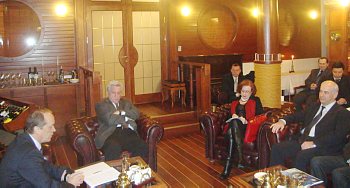
On the 3rd of March the DEC has started a new session of meetings called „Evening Tea“ with the invitation of famous people and diplomats. On the first session the guest was the Ambassador of Russian Federation to Latvia Alexander Veshnyakov.
By a tradition the non-formal meetings are held in the end of the working day. A. Veshnyakov accepted the invitation and became the first participant of this new tradition.
The Club was founded after 1997 and 2003 by commercial counsellor E. Tihonov (Russia), V. Zovtenko (Ukraine), R. Karpinsky (Poland). The idea was also supported by the diplomats from Belarus, Slovakia, China and the Czech Republic. Nowadays many different business meetings and other events take place in the Club.
DEC main partners are BT1, UNIMARS, Novikontas, the Club is also supported by Gallery Park Hotel etc. There are 50 Club Members from 35 countries.
Mr A. Veshnyakov finished Russia’s MFA academy and the S.O. Makarov Leningrad engineering Sea School. He was a deputy, and a Member of the RSFSR counsel. For the next 10 years he was a Chairman of the Central Election Commission of the Russian Federation. Now he holds the position of the Ambassador of Russian Federation to Latvia.
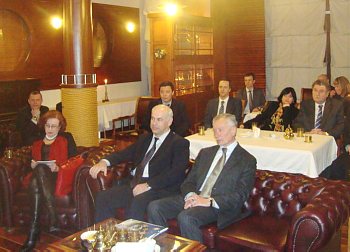
Russia — Latvia: New Relationship
The first step to the improvement of Russia — Latvia relationship was made in 2010 by the president of the Latvian Republic Valdis Zatlers, who made an official visit to Russia from 19 until 22 of December. In 20 years, it was the first visit of such status. The visit of Guntis Ulmanis in 1994 was unofficial, when only a question about military withdrawal from Latvian territory was discussed. However, Zatlers’ visit concerned every aspect of the bilateral relations.
In the course of the Latvian Republic president visit to Russia, an inter-governmental treaties about the cooperation in the economic and social sphere were signed. This was possible because of the massive amount of work that has been done by both countries in interdepartmental and trans-regional sphere and with the help of MFA of both countries.
In July last year, Chief of the Presidential Administration of Russia Mr. Sergey Naryshkin visited Latvia. He awarded Latvia’s notable culture, veteran and social organizations representatives. Sergey Naryshkin was personally accepted by V. Zatlers.
In July last year, Russia’s chairman administrator Sergei Narishkin visited Latvia. Hi awarded Latvia’s notable culture, veteran and social organizations representatives with state rewards. Sergei Narishikin was personally accepted by V. Zatlers. Among the important political contacts would like to mention a visit to Latvia in July last year the Head of the Administration of the President of Russia Sergei Naryshkin, who presented state awards to prominent figures of Latvian culture, representatives of veterans and community organizations. Sergei Narishikin was personally accepted by Mr. V. Zatlers.
Many solutions for questions about practical cooperation were given at the Intergovernmental Commission on the 4th session in Pskov June, 2010. Russian — Latvian Business Council gave active support to the IGC’s work.
Regional connections are dynamically improving. Last year the Mayor of Moscow and the Governor of the Pskov region visited Latvia. On the 25-27 of February the Governor of the Yaroslavl region Sergey Vahrukov made an official visit to Riga. The Mayor of Moscow Sergey Sobyanin and the Governor of St. Petersburg Valentina Matvienko are awaited in Latvia in the beginning of summer.
A tight cooperation bond between Russia’s and Latvia’s life saving services has developed. For helping Russia with its battle against the fire in 2010, Latvia’s national Life Saving service chief Ainars Pencis was rewarded with the Order of Friendship by the Russian Federation President Dmitry Medvedev.
Successfully continues the Joint Demarcation Commission, last year held its two meetings. In the current year, from February 28 to March 3, Riga held a regular meeting of the commission.
Russia’s theater festival „Zolotaya Maska“ (Gold Masque) has became one of the most notable cultural events in Riga.
At this point the main priority is to constantly improve the economic, energetic, transportation, transit and other spheres of interaction.
For the realization of this priority a lot of work needs to be done beforehand.
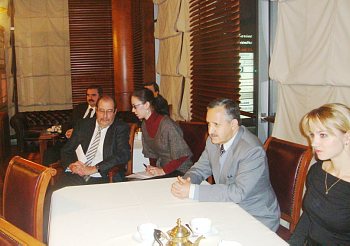
The President of Russian Federation is planning to visit Latvia
The main event in the bilateral agenda is the visit of RF president Dmitry Medvedev to Latvia. However, this does not mean that it will happen this year. All details and questions that will be discussed during the visit must be thought about and prepared carefully. For this reason a regular proceeding of the Intergovernmental committee is scheduled to be in June in Liepaja. The presiding commissioner from Russia will be the Minister of Transport Igor Levitin.The MFA, ministries and institutions of both countries are already working on behalf of the preparations to the visit. In Riga the MFA directors had a meeting in January. On the 25th of February in Moscow a meeting on foreign affairs came to an end.
The parliament discourse can be of help to this matter. The Russia’s State Duma delegation with cooperation of the Saeima is scheduled from the 1st to the 4th of June.
The Church diplomacy plays a big role in building good relationship between Russia and Latvia. In 2012 Russia’s Patriarch Kiril is planning to visit Latvia.
We plan to continue working on the improvement of the legal data-base. We believe that after the treaty on avoidance of dual taxation has been signed, the next logical step would be to sign a treaty on security of investments.
The troublesome questions are well-known. Human rights are still not handled properly according to the history. The main thing is that both sides are opened for discourse, in order to find a mutually acceptable agreement on this matter. The cooperation of the scientists from both Latvian Republic and Russian Federation within the preparation of the joint history committee will help to the agreement. 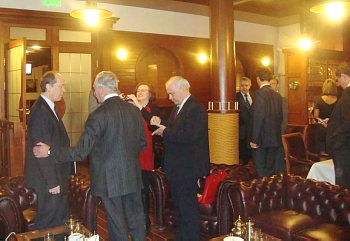
The priorities within the relationship with the EU
Lately, both sides have reached an improvement in building up a strategic partnership. The decisions that were made during Russia — EU Summit conferences in Rostov and Brussels help to build up the cooperation on all matters.Work on the development of a new Russia — EU treaty that is supposed to replace the 1997 mutual partnership agreement is in progress. A new agreement is our initiative. The goal is to see where this Russia’s and EU partnership will lead them and to build a stable jurisdiction foundation.
Russia’s foreign policy central task is to modernize the country and to make an innovative model of development. What does it do with our relationship with the EU?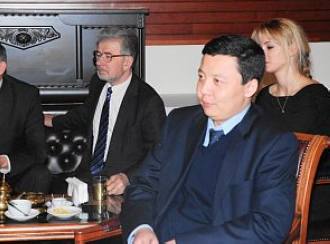
We want Russia’s modernization to be a Europe-wide project like it once was in the Peter the Great era. The strategic agreement with the EU is called — „Modernization Partnership“. The realization of this project has been started during the Russia’s Summit.
Without any doubt this project is beneficial to both sides. The EU is not indifferent with whom to make an agreement. Furthermore, questions about the development are the priority in all the Western and Eastern countries
The fact about the strenght of the global competition is these days is well-known to all. Without the development of science and technology Europe is in danger of becoming a „fenced territory where there are a lot of open-sky museums“ — Sergei Lavrov.I am convinced that our future depends on cooperation and mutually beneficial development.
The modernization is beyond economics
Modernization is beyond economics. Social stability, the security of civil society institutions, the reformation of the jurisdiction system, improvement of law-enforcement agencies, battle against corruption – on behalf of all these questions we are ready to develop our relationship with the EU.
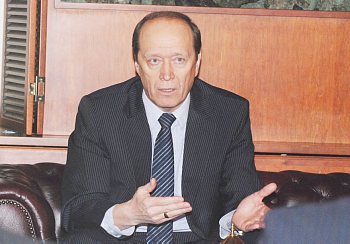 We have something to offer in exchange. The potential of Russia’s inner development is enormous. However, the market of Russia lacks modern technology and is ready to take investments in different economic branches, thus insuring a promising payoff to the investors.
We have something to offer in exchange. The potential of Russia’s inner development is enormous. However, the market of Russia lacks modern technology and is ready to take investments in different economic branches, thus insuring a promising payoff to the investors.
Russia’s largest economic partner is the EU. 50% of our external turnover is on behalf the EU — approximately 300 billion dollars. Russia is on the 3rd place, after the USA and China in the EU’s partnership list.
Russia’s energetic = Europe’s prosperity
The economic relationship with the EU must be mentioned while discussing this question. It is about the EU’s new restrictive investment measures. These measures are harming the interests of Russia’s economists.
This is the so called EU’s „Third energetic package“ with its absurd requirement: „who owns the gas cannot own the transport“. This requirement poses a threat to Russia’s investments into the EU countries energetic centers. However, the European Commission President J.M. Barroso says that Russia’s energy is the key to Europe’s prosperity.
In the end of February there was a RF government – European Commission meeting with the participation of Vladimir Putin. The results are promising.
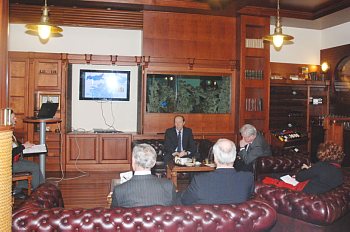
Visa denial is a test on the EU’s characteristics
Talking about our relationship with the EU, we cannot neglect the issue with traveling. This issue was agreed upon dating back from 1975 with the Helsinki Final Act. Afterwards, the objective was to make several OSCE documents. Currently, the problem is still being discussed.
We made a huge step forward with making the visa regime simpler. In order to have strategic partnership, it is better to make a visa-free regime as soon as possible. This will be a sort of test of our relationship. Furthermore, the European partners are more and more pointing out the problem with the visa regime, claiming that it is interfering the economic cooperation between the RF and EU.
Our project on visa cancellation agreement has been introduced during the Russia – EU Summit in Rostov. We hope that on the basis of this project we will manage to agree about the parameters of transition to a visa-free regime, as it also considers a number of wishes from EU.
We are grateful to Latvia for its’ support on visa-free regime development within EU.
In a conclusion, I would like to mention that Russia and EU has common future, without which both sides will lose. We cannot afford ourselves to „ignore“ fundamental changes in the sphere of world economy and politics.
The questions adressed to the Ambassador of Russian Federation to Latvia by the Members of Diplomatic Economic Club concerned different topics. 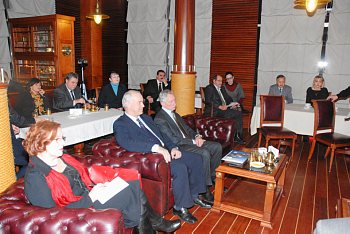
Olga Pavuk: What is the position of Russia towards the situation in Lybia?
Alexander Veshnyakov:In Lybia Russia put to effect multibillion projects. However, it is uncertain whether these projects will be completed. According to UN Security Council’s resolution, we declaim against the violence used in Lybia in relation to demonstrators. We also consider the attempts to solve problem by means of military involvement to be counter-productive. Russia argued against the severe resolution of military force engagement which was put forward by UN Security Council.
Valery Roldugin: How would you evaluate 100 days of cooperation between the Government of Latvia and The Embassy of the Republic of Latvia in Russia which was aimed at deciding the economic issues?
A.V.: It is pleasant to work with the Ambassador of Latvia to Russia Edgars Skuja . He is approachable, active person who is interested in collaboration. Thanks to Edgars Skuja, Latvian President Valdis Zatlers’ visit to Russia was successful.Prime Minister Valdis Dombrovskis is a familiar partner, as he had worked in the previous government. He is more reserved than preceding Minister. Nevertheless, he had to deal with such issues as cooperation with international lenders and economic crisis recovery.
Previous ministers Maris Riekstins and Aivis Ronis had good relationships with the Ministry of Foreign Affairs of Russian Federation. I have communicated with Girtis Valdis Kristovskis a little, but I am conversing with Secretary of State Andris Teikmanis, who is familiar to me as the Ambassador of Latvia to Russia.
Alexander Gaponenko: Could you tell us , please, about the most notable Russia’s capital investment projects in Latvia?
A.V.: Firstly, a large project on construction of high-speed railway Riga — Moscow has to be mentioned. Transport Group in the Government of Russian Federation discussed this project two days earlier. There are still many issues to consider, but work is being done. I hope that the visit of Minister Levitin to Riga in May will clarify many aspects of this project. The President of Russian Federation D. Medvedev gave permission to proceed the project’s realization. He also set a task to end the high-speed railway construction by the FIFA World Cup 2018, which will take place in Russia. This project offers new opportunities for Latvian transit improvements.Reasonable are also the programmers’ of The Ural Mining and Metallurgical Company and Uralchem Freeport of Riga Authority. However, many aspects in programmers’ realization depend on the agreements with the Freeport of Riga Board.
Another major project is the Liquefied Petroleum Gas (LPG) Terminal construction. Its value is about $ 6,5 billions.
If all the plans mentioned are realistic, the relations between our countries will improve greatly. The President of Latvian Republic V. Zatlers, Prime Minister V. Dombrovskis, Minister of Economic Affairs Atis Kampars and CEO of LDZ Ugis Magonis have shown their interest in programmes’ implementation.
Anatoly Butenko: Will it be possible to tackle the issue of traffic jams at the Latvian — Russian border by the year of 2018?
À.Â.: I think, this problem can be solved by means of common efforts before 2018. It depends on the introduction of cargo e-declaration, which will reduce the time required for cargo examination at customs and borders. Furthermore, the improvement of staff work during the heavy traffic has to be taken into consideration.Honorary consul of Mexico to Latvia Arrerando Karlos has shared his exprerience of dealing with traffic jam problem which was common at USA borders.
V.Roldugin: Russia and Latvia have been „neighbors“ already for 20 years. Could there be any parallels drawn between these two countries in economic development? Could you, please, mention any reasons that inhibit these countries from building closer collaboration?
À.Â.: First of all, an appropriate legal base is required for close cooperation. However, a treaty on double taxation evasion has not been yet confirmed by both sides . Moreover, there is no treaty on the alternate investment protection.Secondly, most favored nation treatment is essential point. One example is the rocky relations between two countries. The first visit of Russian Foreign Minister to Latvia took place only three years ago. Today political interests are pointed at business affairs.
The last factor is Russian language, which is spoken by 64% of families in Riga. Thus, this is an attractive aspect not only for tourists from Russia, but also for businessmen.
Stanislav Buka: Will be a visa-free regime introduced during the 2014 Winter Olympics?
A.V..: Russia experienced the time, when visa-free regime was valid for Britons, who bought tickets for hockey match in Moscow. It is possible that this regime will be used during Winter Olympics as well.S.Buka: Baltic International Academy holds negotiations with one of the universities in Russia about the training of volunteers for work at Olympics.
À.V.: We appreciate and are ready to support all the initiatives that are aimed at the development of Russia.A.Butenko: What place the information technologies take in your life? Do you have your personal blog on the internet?
A.V..: I was one of those who organized a modern voting system, with the help of which the results from 90% of electoral districts could be collected in twenty-four hours’ time. The otcome was even better than in USA. In my personal life I use Internet, but not so well. I will work on this question.A.Butenko: In conclusion, could you , please, tell us about your culinary preferences?
À. V.: I do not have any special preferences. However, I was born in a place located at the coast of White Sea, so I like fish. The fish in Latvia is also very delicious. I prefer to drink a cranberry-juice. By the way, this berry is also very popular in Latvia. 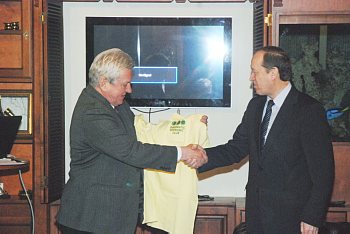 Honorary President of the Club Evgeny Tikhonov thanked the Ambassador of Russian Federation to Latvia A.Veshnyakov for his visit to the Club and presented the traditional souvenir. E. Tikhonov also expressed the opinion about the reasonability of holding such meetings at the Club.
Honorary President of the Club Evgeny Tikhonov thanked the Ambassador of Russian Federation to Latvia A.Veshnyakov for his visit to the Club and presented the traditional souvenir. E. Tikhonov also expressed the opinion about the reasonability of holding such meetings at the Club.
Meeting was attended by:
Askar Mahmutov, Alexander Gaponenko, Evgeny Tikhnov, Alexander Sushkevich, Igor Nazaruk, Igor Zaharciuk, Vladimir Lavo, Marta Stolarova, Viktor Danilokh, Sergey Ratnikov, Urs Buhler, Karlos Arredondo, Olga Pavuk, Valery Roldugin, Stanislav Buka, Grigory Pomerancev, Natalia Alekseeva, Nikolay Kolotilo and other.
Olga Pavuk , DEC Baltic-course.com
Translate E. Krohmalnaya and D.Sorokin

 Appeal to world leaders and humanity
Appeal to world leaders and humanity
